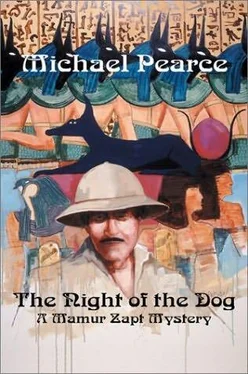Michael Pearce - The Mamur Zapt and the Night of the Dog
Здесь есть возможность читать онлайн «Michael Pearce - The Mamur Zapt and the Night of the Dog» — ознакомительный отрывок электронной книги совершенно бесплатно, а после прочтения отрывка купить полную версию. В некоторых случаях можно слушать аудио, скачать через торрент в формате fb2 и присутствует краткое содержание. Жанр: Исторический детектив, на английском языке. Описание произведения, (предисловие) а так же отзывы посетителей доступны на портале библиотеки ЛибКат.
- Название:The Mamur Zapt and the Night of the Dog
- Автор:
- Жанр:
- Год:неизвестен
- ISBN:нет данных
- Рейтинг книги:3 / 5. Голосов: 1
-
Избранное:Добавить в избранное
- Отзывы:
-
Ваша оценка:
- 60
- 1
- 2
- 3
- 4
- 5
The Mamur Zapt and the Night of the Dog: краткое содержание, описание и аннотация
Предлагаем к чтению аннотацию, описание, краткое содержание или предисловие (зависит от того, что написал сам автор книги «The Mamur Zapt and the Night of the Dog»). Если вы не нашли необходимую информацию о книге — напишите в комментариях, мы постараемся отыскать её.
The Mamur Zapt and the Night of the Dog — читать онлайн ознакомительный отрывок
Ниже представлен текст книги, разбитый по страницам. Система сохранения места последней прочитанной страницы, позволяет с удобством читать онлайн бесплатно книгу «The Mamur Zapt and the Night of the Dog», без необходимости каждый раз заново искать на чём Вы остановились. Поставьте закладку, и сможете в любой момент перейти на страницу, на которой закончили чтение.
Интервал:
Закладка:
“Oh no. He was one of-the audience, I suppose I should say, one of the onlookers, anyway. He had sort of strayed into the ring, been drawn in, I suppose, like so many others. There were lots of them, you know, ordinary people. They pressed forward during the dancing and then they began to join in. It was very infectious. I felt quite like joining in myself. Only I thought Captain Owen would not approve of me.”
She gave Owen a look which he considered afterwards he could only describe as arch.
Mahmoud, however, was concentrating.
“This particular onlooker, the one the Zikr nearly bumped into, was he joining in?”
“No. He was just standing there. That is why I noticed him. I thought he was, well, you know, a bit dazed or something, bowled over by it all. I was afraid he would get in the way. And then, when the Zikr stumbled, I thought he had got in the way.”
“Could you describe him for us, Miss Postlethwaite?” Mahmoud asked. “What was he wearing, for instance?”
“Oh, ordinary clothes.”
“Ordinary Western clothes or ordinary Egyptian clothes?”
“How silly I am. Of course. Ordinary Egyptian clothes. A long gown. A-galabeah, is it?”
“You’re picking up our language well, Miss Postlethwaite,” said Mahmoud encouragingly. “Galabeah is quite right. A blue one?”
“No. Darker than that. Grey? Black?”
“Are you sure about that, Miss Postlethwaite?” Owen interposed.
“Well, not absolutely. It was dark by then and hard to see in the light. It was just that in comparison with the others his seemed dark.”
“Did you see what kind of turban he was wearing?”
“I am afraid not. I’m sorry. One turban is much like another to me. Darkish, anyway. Like his gown.”
Owen exchanged surreptitious glances with Mahmoud. It was early yet but he was already beginning to have a sinking feeling.
“Anything else, Miss Postlethwaite?” asked Mahmoud.
“Not really. I saw him only fleetingly.”
“How old was he?”
“Thirty, forty-”
“You saw his face?”
“I must have,” said Jane, concentrating. After a moment or two she shook her head. “I don’t remember it at all clearly, I’m afraid.”
“Hands?”
“Hands?” said Jane, startled.
“Sometimes they are distinctive.”
“Yes,” said Jane, looking at him with interest. “Yes, they are. Well, I did see his hands, but there was nothing distinctive about them. It was just-”
She broke off and thought for a moment. “I don’t remember his hands,” she said at last, “but I do remember hers.”
“Hers?”
“The woman’s.”
“What woman’s?”
“Don’t you know?” said Jane, surprised. “Oh, I see, you’re testing me. The woman he was with.”
Mahmoud recovered first.
“Tell us about this woman, please, Miss Postlethwaite,” he asked.
“Right,” said Jane obediently. “Well, we were in a sort of enclosure, you know, masked off by ropes. During the dancing this woman came right up beside me, outside the enclosure-I was at the very end of the row, next to the rope, there was a carpet hung over it, too, which made it into a sort of wall-and put her hand on the rope just in front of me. That’s why I saw it in the first place. But then, of course, I noticed it. She had such lovely hand-painting. Lots of Egyptian women do, don’t they?”
“Yes,” said Mahmoud, “although it’s going out now, or so my mother says.”
“Does she herself hand-paint?” asked Jane.
“No!” said Mahmoud, immensely amused at the thought of his rather Westernized mother engaging in the traditional Egyptian arts. “It’s not confined to the poorer classes but it’s certainly most common there. You find it generally where the old customs are strongest.”
“Such beautiful patterns!” said Jane enthusiastically.
“In general?” asked Mahmoud. “Or just in the case of the woman you saw beside the enclosure?”
“Both!” said Jane. “But I noticed the woman because I thought her patterns were especially lovely. She didn’t paint the whole palm, you know, not like they usually do, she just sort of sketched it in and then echoed it around the knuckles and nails. But what really caught my eye were her wrists. She had a most intricate pattern around them, all in delicate blue, not the usual blue of the poorer women, and not that rich orangey-red you often see. It ran round her wrist in a series of hooks and crosses all linked together, like a sort of painted bracelet.”
“Crosses?” said Owen. He was quite sure about the sinking feeling now.
“Yes. Small square ones. That’s a traditional pattern too, isn’t it?”
“Yes,” said Owen, “especially among some people.”
Mahmoud was pleased.
“You are a most excellent observer, Miss Postlethwaite,” he told her warmly.
“I could hardly help noticing, could I?” said Jane, half-apologetically. “It was right before my eyes.”
“Yes, but not everyone notices what’s right in front of their eyes.”
Owen kept his own eyes looking firmly out of the window.
“Can you tell us anything else about this woman, Miss Postlethwaite?” asked Mahmoud.
“Not really,” said Jane. “She was dressed from head to foot in one of those black gowns. I suppose I wouldn’t even have seen her hand if she had not put it on the rope. The only thing-” She hesitated.
“Yes?” prompted Mahmoud.
“The only thing I remember,” she said, “was the smell.”
“What sort of smell?”
“Scent.”
“She had a lot of perfume on?”
“No. Not exactly. Not in that way.”
“Distinctive? A distinctive perfume? Heavy, perhaps?”
Jane shook her head.
“Not really. I don’t quite know what it was. Perhaps it was where it was that surprised me.”
“Where it was?”
“Yes. It wasn’t on her wrist or on her throat, not where you’d usually put it. In fact, it wasn’t on her at all. It was on her sleeve. And-not just on one part. All over her sleeve.”
“Ah.”
“That means something to you, does it?” she said, looking at Mahmoud.
“It might. Tell me-can you remember-was it one perfume or different ones?”
“How clever of you. Different ones. She had been trying them on, you think? But on her sleeve?”
“You’ve been very helpful, Miss Postlethwaite,” said Mahmoud. “Truly very helpful.”
“Is it important?” asked Jane. “I don’t quite see-”
“It might be,” said Mahmoud. “Now, can we just go back a little. At a certain point you became aware of this lady placing her hand on the rope. When exactly was that?”
“I can’t say exactly. Towards the end of the dancing? Yes, it must have been towards the end because at the start, you know, the women were at the back, it was the men who were at the front, and then as the dancing went on everyone became sort of drawn in and some of the women came forward, though of course they didn’t actually join in the dancing or anything like that, except to cry out and encourage the dancers.”
“And that was when this woman came forward?”
“Yes.”
“With the man?”
“Oh no. He was already there. So far forward that he was almost part of the dance.”
“When did they meet up, then?” asked Mahmoud. “You spoke of her as being with him.”
“Afterwards. They left together.”
“When the Zikr collapsed?”
“Yes. He stepped back into the crowd. I think he realized that it was partly his fault, that he had bumped into the Zikr. I mean, he shouldn’t really have been there, should he? He was just getting in the way. He stepped back right in front of me, I couldn’t see the dancers for a moment or two, that’s how I remember, but then the crowd let him in and he slipped back along the rope.”
Читать дальшеИнтервал:
Закладка:
Похожие книги на «The Mamur Zapt and the Night of the Dog»
Представляем Вашему вниманию похожие книги на «The Mamur Zapt and the Night of the Dog» списком для выбора. Мы отобрали схожую по названию и смыслу литературу в надежде предоставить читателям больше вариантов отыскать новые, интересные, ещё непрочитанные произведения.
Обсуждение, отзывы о книге «The Mamur Zapt and the Night of the Dog» и просто собственные мнения читателей. Оставьте ваши комментарии, напишите, что Вы думаете о произведении, его смысле или главных героях. Укажите что конкретно понравилось, а что нет, и почему Вы так считаете.












